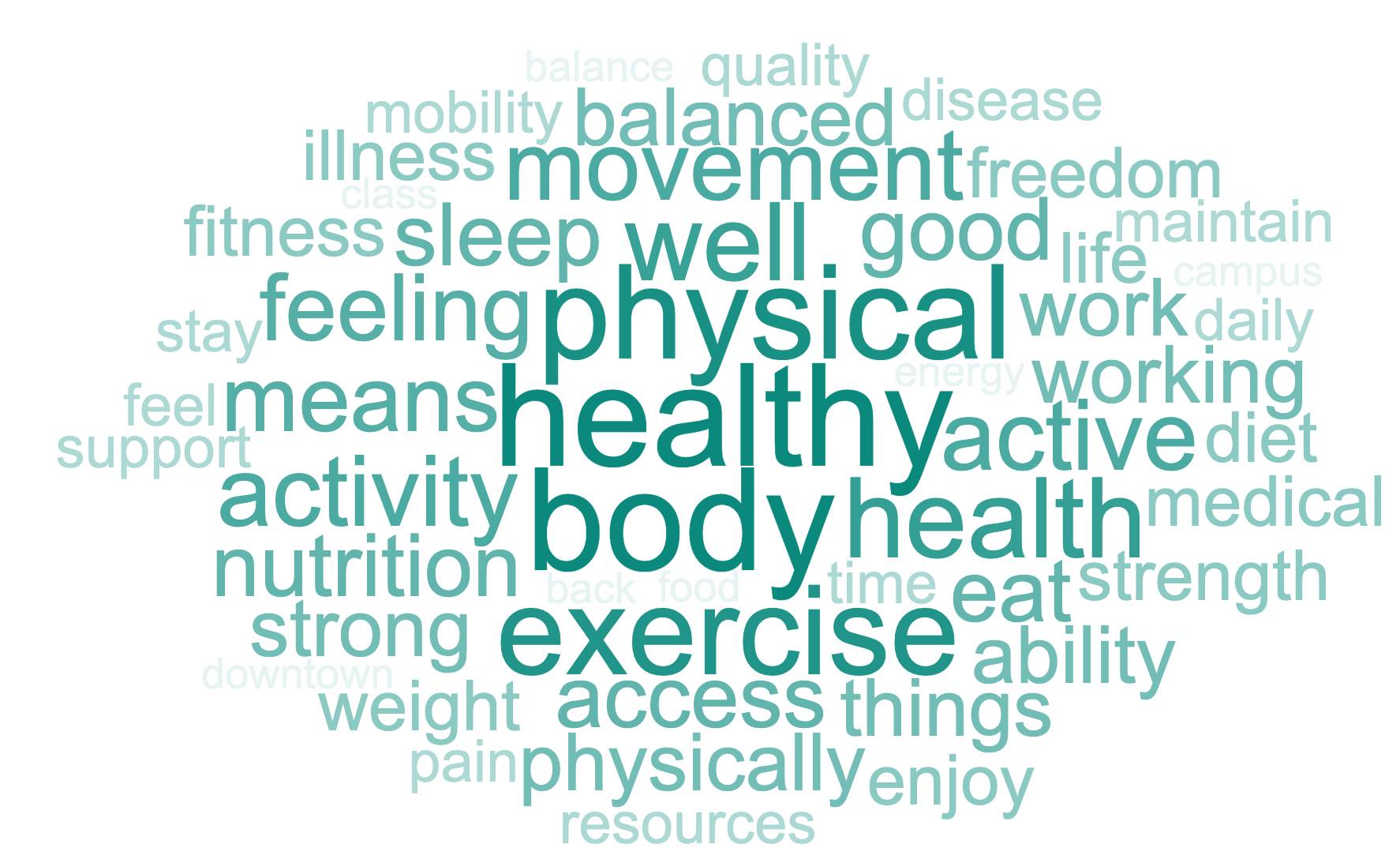Physical Wellness
Physical Wellness is knowing your body and providing what it needs for health, healing, and energy. Below are some ideas of what physical wellness means to our GV community.

Be Physically Well
- Your body does a lot of work when it sleeps. It is repairing itself to be fit and ready for another day. It’s also working on preventing weight gain, heart disease and illness duration. That’s why it’s so very important to get enough sleep to feel well-rested each morning.
- How do you do that? Avoid caffeine and alcohol in the evenings. Don’t bring school work or your phone to bed with you. Get up at the same time each day. Keep your room at a temperature between 60 and 67 for optimal sleep.
- Schedules can be hectic and irregular for the typical college students, and sometimes that means that meals and food intake can also be hectic and irregular.
- The best tip: listen to your body and eat within 30-60 minutes of feeling hungry. Try to plan ahead and have snacks on hand for days when meals may be hard to squeeze in. Connect with on-campus dietitians to learn more about the best foods for you.
- Drinking on college campuses can vary greatly from abstinence to safe and responsible drinking to binge and dangerous drinking.
- AOD (Alcohol & Other Drug Services) can help you make informed decisions regarding alcohol and other drug use. Be safe. Be smart. Be responsible.
- Sexual health can cross many dimensions of wellness so it’s important to make informed decisions that are best for you!
- Are you going to abstain from sexual activity? Are you ready to become, or stay, sexually active? Do you know how to protect yourself and your partner or partners from STIs? Did you know you can get free condoms on campus?
- Preparing to take on your own healthcare can be overwhelming, but there’s a few simple things you can do to make the transition smoother.
- Find a local health care provider like the Campus Health Center or GVSU Family Health Center. Be sure that you understand if you have insurance and what’s covered before care. And, don’t forget to take preventative steps to stay healthy like getting your flu shot and washing your hands.
- Physical activity is important for both your physical and mental health. Recreation and Wellness has many opportunities to help you reap the benefits including the Climbing Center, UFit Plan, Intramural Sports, Group Exercise classes, and much more!
- There are weekly recommendations such as provided by the American College of Sports Medicine (ACSM), but any length or type of movement throughout your day can be beneficial.
Resources
On Campus
Visit the Laker Food Co. Dietitian.
- Schedule a Nutrition Consultation.
- Learn more about diet and food allergy resources.
Visit the GVSU Health Hub for more about student health at GVSU. You'll find info about the GV Family Health Center and the Campus Health Center as well as student health insurance and other campus resources.
Visit the Recreation & Wellness website.
- Get involved with sport and recreation opportunities.
- Participate in exercise classes.
- Try rock climbing at the climbing center.
Visit Replenish.
- Find food and food resources on the Allendale, Pew, and Health campuses.
- Learn more about the Laker Meal Share program.
Know that beginning (or continuing) to explore your sexuality in college is normal! Get info from our Facts about Sexual Health page to stay informed and make the best decisions for you.
- Get Free Condoms and learn about other barrier methods and birth control.
- Participate in free monthly STI testing provided by Ottawa County Department of Public Health.
- Request a presentation from the WIT Peer Educators.
Off Campus
Visit the GRSSC website.
- Join leagues for a variety of sports, such as soccer, basketball, and volleyball.
- Meet new friends while competing with other teams.
- Play other fun games, like kickball and ultimate frisbee.
Find out about local farmers markets.
- Support local farms.
- Access healthy food.
- Connect with the community.
Visit the YMCA of Greater Grand Rapids website.
- Participate in programs and classes focused on fitness, training, sports, and more.
- Find support and encouragement to regularly exercise.
- Work with others toward achieving your fitness goals.
Online
Apps such as Calorie Counter by Cronometer may be helpful with tracking nutrition goals by monitoring:
- Macronutrients (such as protein, fats and carbohydrates)
- Caloric intake and workouts
- Micronutrients (such as vitamins and minerals)
Nutrition trackers can be beneficial to some people but harmful for others. It's always important to receive medical advice from your healthcare provider first!
Keep hydrated with the Plant Nanny app.
- Keep track of how much water you drink daily.
- Receive hydration reminders.
- Complete small missions to encourage drinking more water.
Get better sleep with the Sleep Cycle Tracker app.
- Analyze your sleep patterns to improve your quality of sleep.
- Utilize the smart alarm clock, which wakes you up during your lightest sleep phase within a window of time.
- Get detailed statistics about your sleep.

